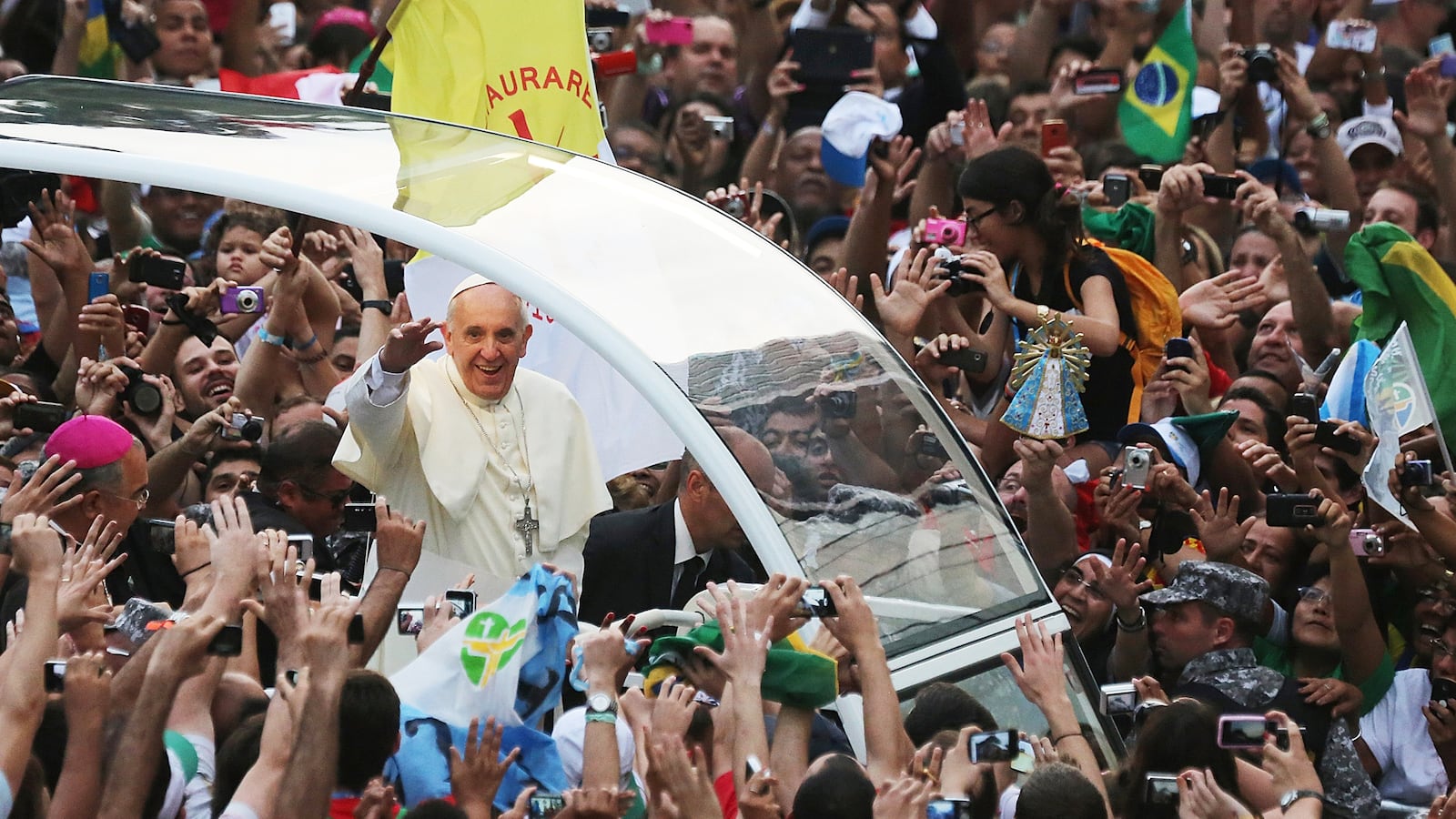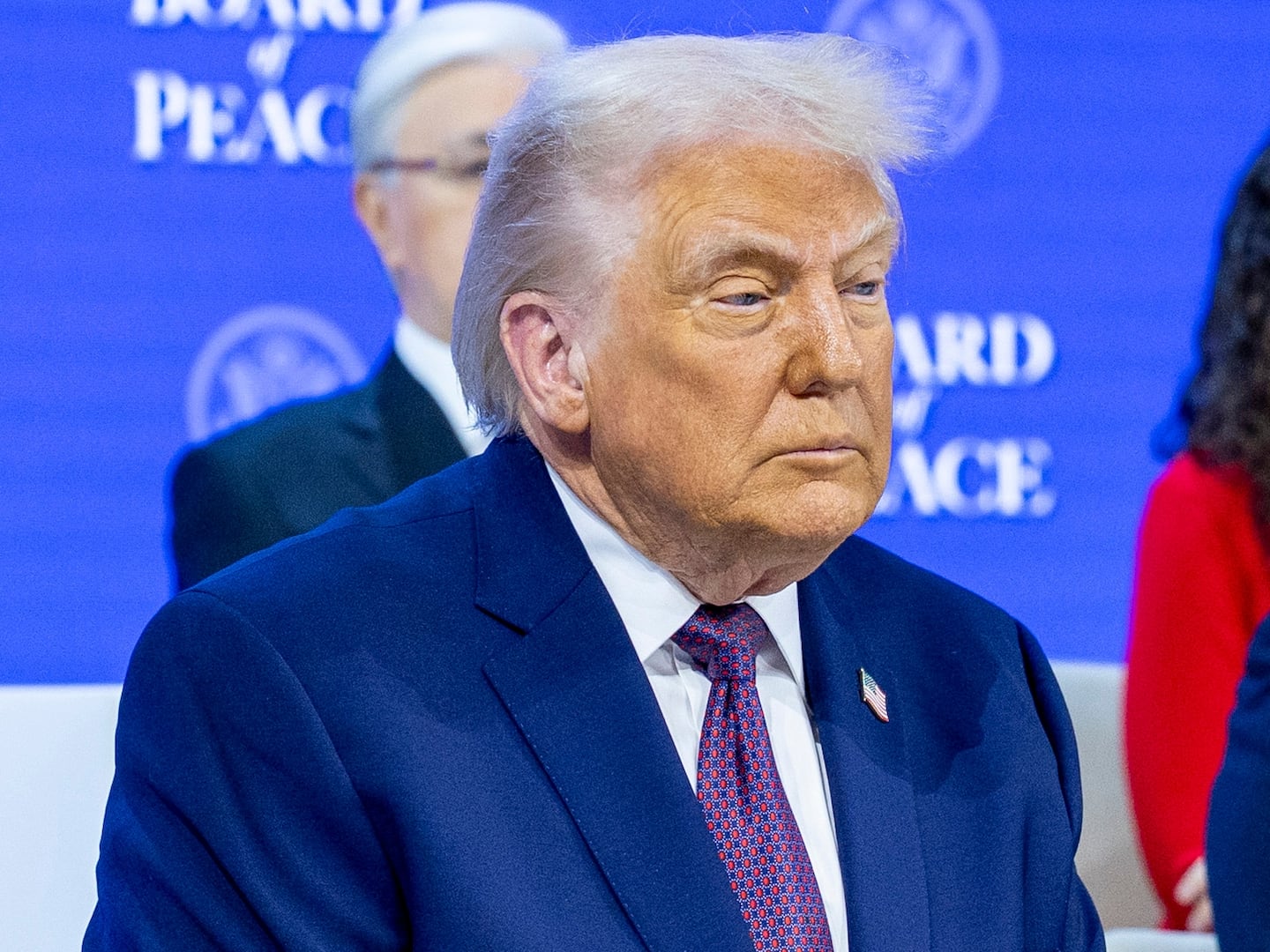A papal visit, by definition, is freighted with emotion and pageantry. But add a chaotic metropolis, a bad turn, a devout mob at every corner and a visitor with an allergy to protocol, and you have the makings for a logistical nightmare.

So it was late Monday when Pope Francis touched down in Rio de Janeiro to kick off his first international trip, predicting a "stupendous" visit, and then promptly hit a human roadblock. Taking an unexpected turn, the pontiff's motorcade veered from the designated route onto a gridlocked downtown thoroughfare, where his silver Fiat station wagon was jammed between a wall of city buses and a riptide of well wishers, ecstatic over their good fortune in catching the vicar of Rome in slow motion.
Fortunately, the guest of honor was Jorge Mario Bergoglio, the ultrapopular Argentine-born prelate who thrives on serendipity and pressing the flesh, even if it means giving his bodyguards heart failure. Lucky for him, his destination was Brazil, the world's largest Catholic nation, which may be doubting its faith lately but never misses a chance for a street party.
If the assassination attempt against Pope John Paul II added the armor plated papamobile to the Vatican's accessories, the untethered Francis might well persuade Rome to acquire an off-road vehicle.
While local and national officials traded barbs over who screwed up in Rio, Francis made the most of the mishap. To the despair of Vatican security, he threw open his window, waved at his flock, patted hundreds of heads and kissed eight babies while worshipers and tourists trotted alongside the convoy, firing off cellphone snapshots and shouting "Viva Papa Francisco!" The joyous rabble ushered him from the maw of downtown to the city's iconic, cone-shaped cathedral, where he boarded the official popemobile for yet another spin through town.
The day could easily have gone wrong, as security pundits and transit wonks warned endlessly on endless talk-radio shows and live television feeds. But whatever the sins of Rio, after such a glowing welcome it was hard to claim that the Roman Catholic Church was in crisis.
It was a fitting start to Francis's weeklong trip Brazil, where he will meet with bishops, visit slums, helicopter to the national shrine in Aparecida do Norte, and speak to the world from a jerrybuilt white altar on Copacabana beach. Officially, his trip is to celebrate World Youth Day, a key date on the Catholic calendar held in a different country every two to three years and aimed at rallying youth to the faith.
Francis's journey has been hailed as a stress test for a church in turmoil and looking for inspiration amid a toxic combination of sex scandals, profligacy, and official despondency that has thinned the pews and seen Rome outflanked by aggressive rivals from fundamentalist Islam to evangelical Pentecostalism.
It's telling that he’s launched his papacy with a trip to Brazil, a traditional Catholic stronghold and home to 11 percent of Rome's 1.2 billion global flock, but which also has seen a steady exodus from the church. Just 30 years ago, nine of 10 Brazilians identified themselves as Roman Catholics. By 2010, only two in three did. Meanwhile, aggressive Protestant evangelical orders have seen their numbers surge, from 5 percent in 1970 to around 22 percent today, according to the Pew Research Center. Atheism has grown even faster.
But more than religious affiliation is at stake in the papal visit. Francis's pilgrimage takes place at a time when raucous protests have roiled the Brazilian streets and put the national political establishment on notice. For the record, officials have comforted themselves in the nation's rise to global prominence and the improved fortunes for millions. "Brazil takes great pride in its extraordinary achievements in reducing poverty in the last 10 years," President Dilma Rousseff intoned in her welcome address yesterday.
And yet the return of inflation and a slowing economy have eroded wages and stoked resentment, putting national leaders on the defensive. Almost daily, protesters have gathered before the apartment building that is home of Rio state Gov. Sergio Cabral, venting over the low quality of public transportation, failing health care and schools, and lavish spending on showpiece soccer stadiums "for gringos to see," as Brazilians like to say. "We would gladly trade our soccer for your education," read one popular protest banner, when Brazil played Japan in last month's Confederations Cup, held in Rio.
Not even Rousseff has been spared, her approval ratings tumbling from over 57 percent in early June to below 30 percent today. And though Brazil's economic decline is not yet dramatic, the government's recent decision to slash spending and tighten lending rates to hold down creeping inflation has fed the anxiety on the streets. "When prices rise and begin to eat into wages, Brazilians get nervous and frustrated," says Brazilian political analyst and blogger Sergio Abranches. "That discomfort transfers directly to the national leader."
Pope Francis has taken notice. His arrival speech yesterday, while skirting political themes, seemed tailored for a nation that had lost its patience for peacocking officials and their freehand with taxpayers’ money. "I come not with silver or gold, but the most precious thing given to me: Jesus Christ," he told dignitaries at the state governor's ornate Guanabara Palace, even as protesters gathered outside.
The message was a sharp counterpoint to the behavior of elected leaders, such as congressional President Henrique Alves, who squired his family aboard an Air Force plane to the final match of the Confederations Cup in Rio last month. Caught out by the Brazilian press, Alves reportedly reimbursed the government for the $4,000 in travel costs, while his colleague, Senate leader Renan Calheiros, also returned some $14,000 to public coffers for flying an official plane to a fellow lawmaker's wedding.
It's too early to say how the new vicar of Rome will fare in these hostile times. But judging by his triumphant welcome in Brazil, and his timely message of official circumspection, Francis's biggest challenge for now may be avoiding getting loved to death.






